How to Pursue Legal Action Against A Trucking Company
As they say, knowledge is power, especially when you're up against a trucking company in the courtroom. If you've been in an accident involving a truck, it's crucial you understand the legal avenues open to you. You've got a narrow window to act due to the statute of limitations, and figuring out who's liable—be it the driver or the company itself—can greatly affect the outcome of your case. But here's the kicker: there's a strategic approach to make sure you don't just start on this journey but also stand a strong chance of securing the compensation you deserve. Uncover what moves to make next, and why understanding the intricacies of this process could be the game-changer in your claim.

Key Takeaways
- Understand the statute of limitations in your state to ensure timely lawsuit filing.
- Identify all liable parties, including the trucking company, driver, and manufacturers, for a comprehensive legal strategy.
- Gather evidence and documentation to strengthen your case for compensation covering medical bills, lost wages, and pain and suffering.
- Utilize FMCSA regulations and industry statistics to highlight violations and support your claim against the trucking company.
Understanding Legal Processes
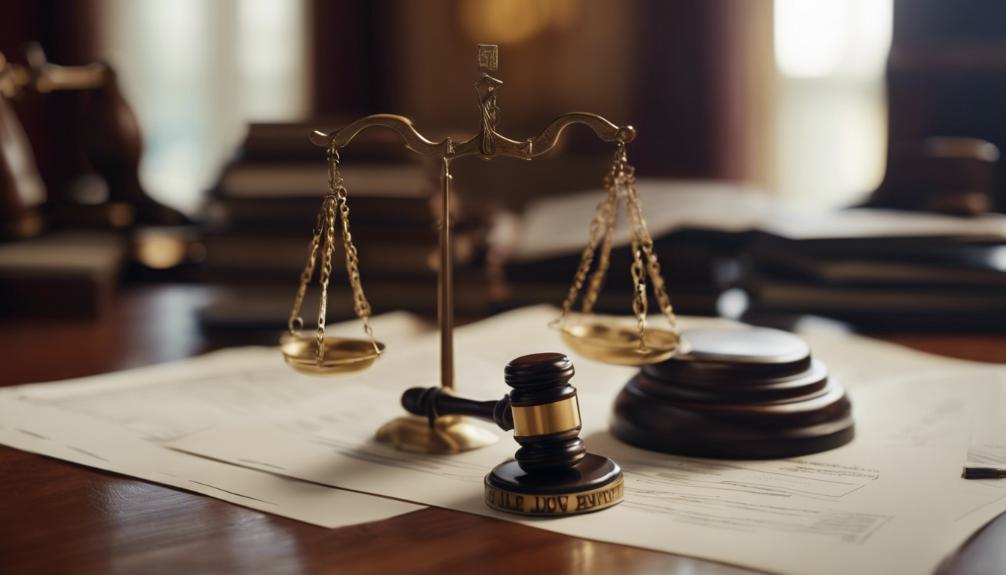
Understanding the legal processes involved in pursuing action against a trucking company requires a clear grasp of several critical steps. You've got to be aware that there's a time limit, known as the statute of limitations, which dictates how long you have to file your lawsuit. This varies by state, so you'll need to act swiftly. It's also important to understand that the trucking company may not be the only party responsible for your accident. Identifying all liable parties is essential for a successful claim. The process can seem challenging, but knowing that the timeline and specific requirements can differ drastically depending on where you are, helps you set realistic expectations for your case. Remember, you're not alone in this, and seeking legal guidance is a wise step.
Compensation for Accident Damages
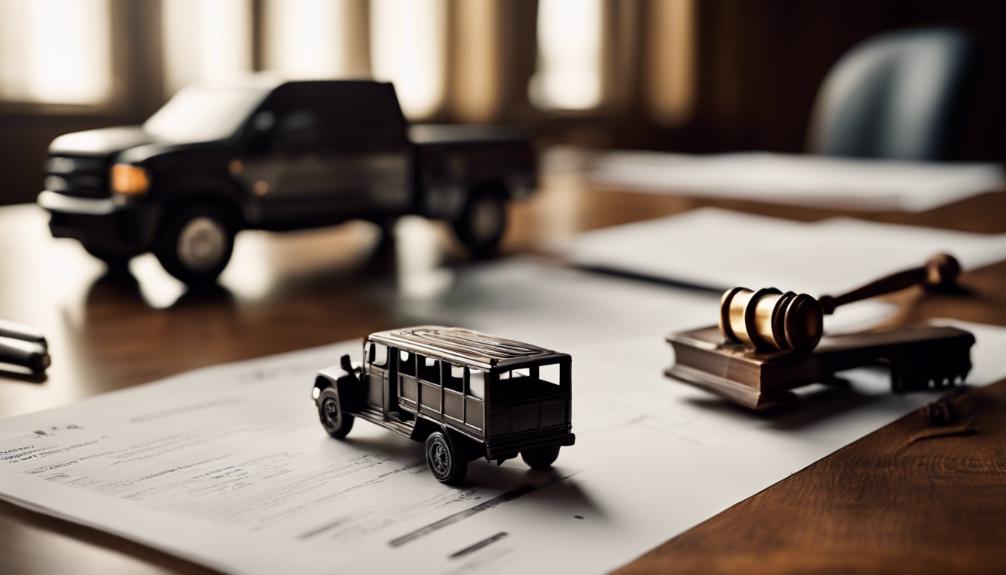
After grasping the legal processes, it's time to focus on securing compensation for accident damages you've suffered. This step is important in your recovery journey, both physically and financially. The compensation you're aiming for can cover a range of losses, including medical bills, lost wages, and pain and suffering. It's essential to gather all necessary documentation related to the accident—medical reports, police records, and any evidence of lost income. This evidence strengthens your case against the trucking company, showing the extent of your damages. Engaging a seasoned attorney can greatly enhance your chances of getting the full compensation you deserve. They'll navigate the legal intricacies, negotiate with insurance companies, and, if necessary, represent you in court to make sure justice is served.
Statute of Limitations Explained

The statute of limitations sets a deadline by which you must file a lawsuit against the trucking company to seek compensation for accident damages. Understanding this timeframe is important because once it passes, you can't legally demand compensation. This period varies by state, usually ranging from one to four years for personal injury and property damage claims. Don't wait to act; starting early gives you ample time to gather evidence, consult with a legal expert, and build a strong case. Missing this deadline means forfeiting your right to sue, regardless of how strong your case might be. Checking your state's specific laws immediately after an accident to make sure you don't lose your chance for justice and compensation.
Identifying Liable Parties

Determining who's at fault in a trucking accident is important for your legal strategy. Beyond the truck driver, there may be multiple parties liable for your injuries and damages. This can include the trucking company, the manufacturer of the truck or its parts if a mechanical failure contributed to the accident, and even third-party logistics providers involved in the truck's operation. Identifying these parties requires a thorough investigation into the accident's circumstances, the employment status of the driver, and the maintenance records of the vehicle. It's vital to gather as much evidence as possible, such as accident reports, witness statements, and the truck's electronic logging device data, to build a strong case. Each party's role in the accident affects how you pursue compensation, making this step critical.
Trucking Company Responsibility
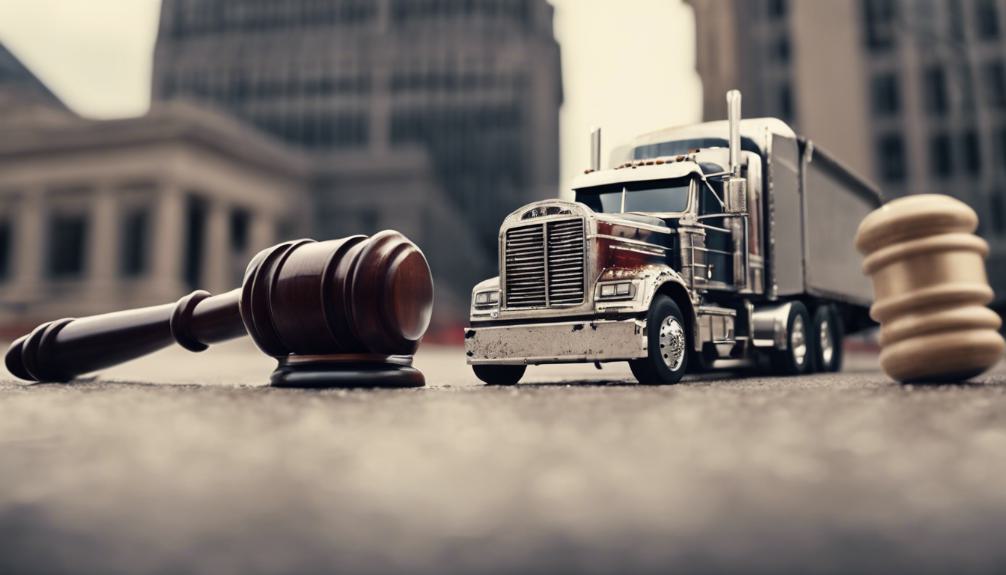
Understanding who's at fault in a trucking accident leads us directly to examining how trucking companies might share responsibility for your injuries and damages. It's not just about the driver's actions; the company itself could be liable due to negligence in hiring practices, inadequate training, or failure to maintain vehicles properly. You've got to dig deep and uncover if they've skirted regulations, overloaded trucks, or set unrealistic schedules that push drivers beyond safe limits. If you've been hurt, it's essential to look beyond the immediate cause and question the broader practices of the trucking company. They're accountable for ensuring their operations don't put the public at risk. Identifying their role in your accident can greatly bolster your case for compensation.
State Variations in Legal Timelines
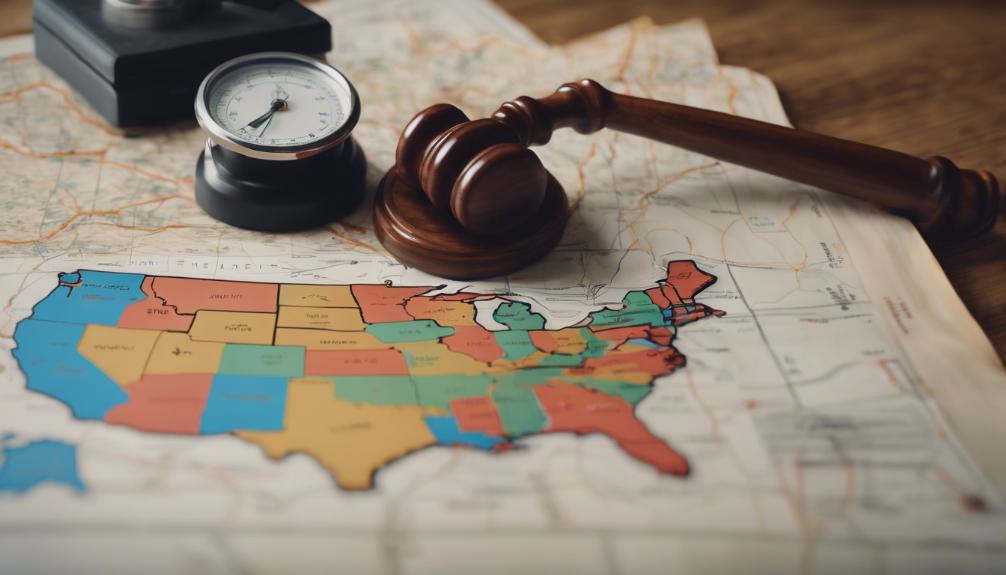
Exploring through the complexities of legal timelines for filing a lawsuit against a trucking company, you'll find that each state's rules can greatly differ. Some states may give you a couple of years from the date of the accident to file your claim, while others might offer a narrower window. This variation makes it essential to act swiftly; you don't want to miss your chance to seek justice due to a procedural oversight. It's also worth noting that certain states impose specific pre-suit requirements, such as mandatory mediation sessions or the submission of a formal intent-to-sue notice before you can officially file your lawsuit. Understanding these nuances is key to effectively traversing the legal landscape and ensuring your case proceeds without unnecessary delays.
Initiating an Insurance Claim
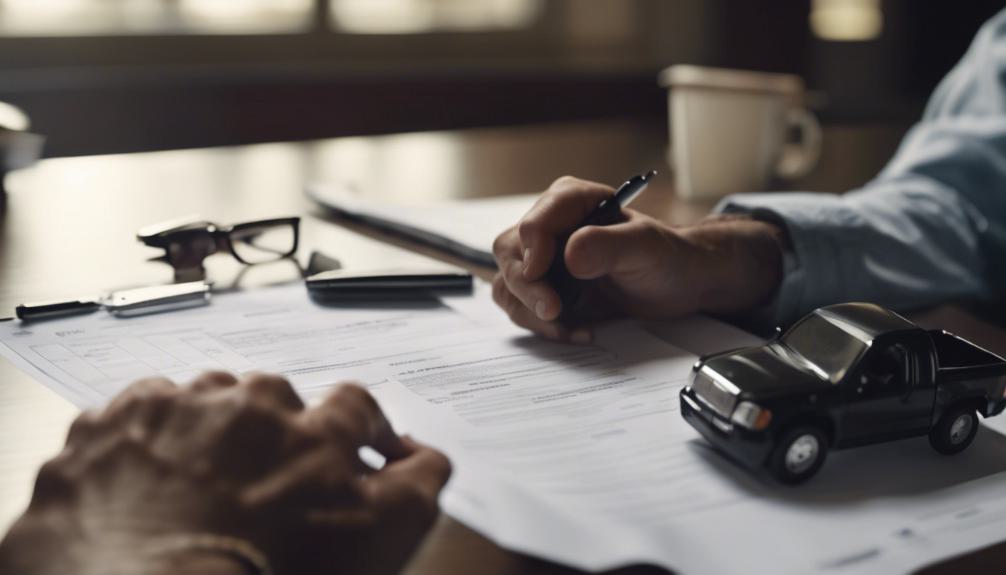
After familiarizing yourself with the legal timelines, it's important to focus on how to initiate an insurance claim against the trucking company involved in your accident. First, gather all necessary documentation, including the accident report, medical records, and any evidence of the damage. You'll then need to contact the trucking company's insurance provider directly. Be prepared to provide a detailed account of the incident, backed by your collected evidence. It's essential to file this claim as soon as possible, adhering to any specific deadlines your state may have. Remember, the goal here is to make sure that you're laying a solid foundation for your case, enabling you to pursue the compensation you deserve for the damages incurred.
The Importance of Legal Representation
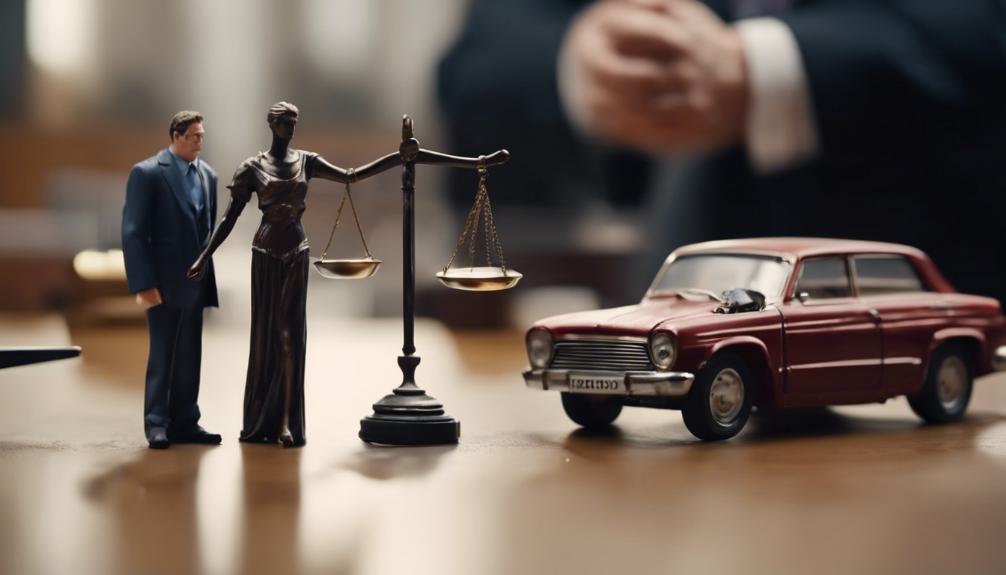
Navigating the intricate legal terrain after a trucking accident requires adept legal representation to protect your interests. The legal process is complex, with various statutes of limitations and potential liable parties, including the trucking company itself. You'll need someone who knows how to handle these waters, ensuring you don't miss critical deadlines or overlook potential sources of compensation.
Additionally, trucking companies often have their own legal teams and insurance adjusters trained to minimize payouts. Without your own lawyer, you're at a significant disadvantage. They'll handle everything from filing the lawsuit within the proper timeline to meticulously documenting your case. Remember, the trucking industry is regulated by specific federal and state laws, making specialized knowledge from a legal representative not just helpful, but essential.
Securing Full Compensation

To make certain you secure full compensation from a trucking accident, it's important to understand the steps involved in the legal process. First, you'll need to document everything related to the accident. This includes reporting the accident immediately, taking photos of the scene, and gathering witness statements. Don't forget to consult with a doctor and keep a detailed record of your medical treatments and expenses. It's also essential to determine the trucking company's liability, which may require researching FMCSA regulations and utilizing statistics from the Insurance Information Institute. Remember, securing full compensation isn't just about covering your current medical bills; it's also about ensuring you're compensated for any future medical treatments, lost wages, and pain and suffering. Being thorough in your documentation and understanding the legal framework increases your chances of a favorable outcome.
Navigating the Court Process
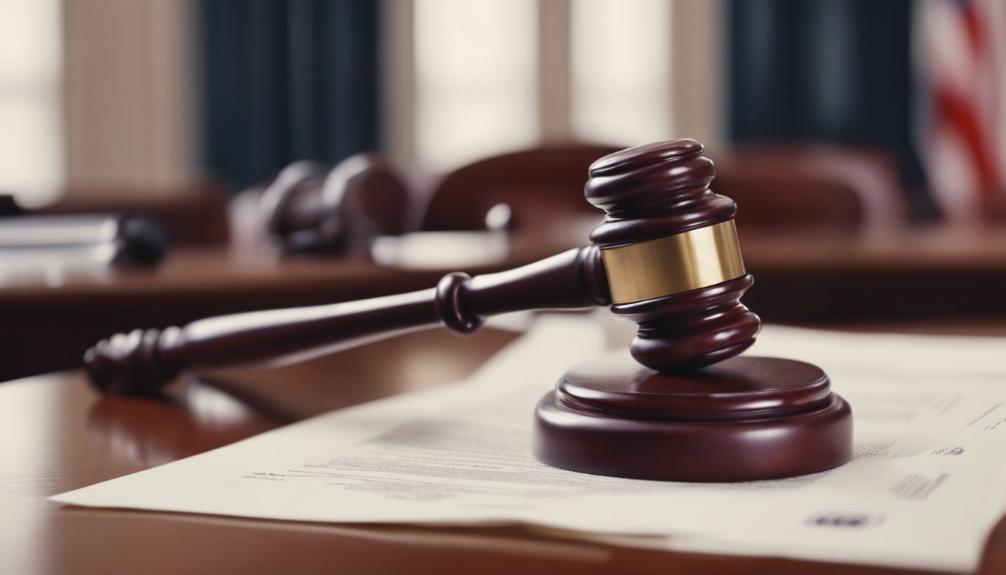
Understanding how to secure full compensation sets the stage for effectively traversing the court process in a trucking accident lawsuit. Once you've identified the trucking company's role in the accident, you must file your lawsuit within the statute of limitations, which varies by state. This step is vital; missing this deadline can forfeit your right to pursue compensation.
Engaging a skilled attorney who's well-versed in trucking laws enhances your chances greatly. They'll navigate the complex legal waters, ensuring your case adheres to all procedural requirements. Remember, the court process can be lengthy and involves several stages, including filing, discovery, and possibly trial. Your attorney will be your guide, fighting to present your case compellingly, aiming for the best possible outcome.
Documenting the Accident Thoroughly

Begin documenting the accident immediately after it happens, capturing every detail that could highlight the trucking company's liability. Snap photos of the scene, your vehicle, the truck, and any visible injuries. Don't rely on memory alone; jot down everything you remember, including the weather, traffic conditions, and any immediate reactions from the truck driver or witnesses. Speaking of witnesses, get their contact information—they can provide vital statements later on. Request a copy of the police report as it's an authoritative record of the accident. Also, keep a detailed log of your medical visits, treatments, and how your injuries impact your daily life. This detailed documentation forms the backbone of your case, supporting your pursuit of fair compensation.
Determining Trucking Company Liability
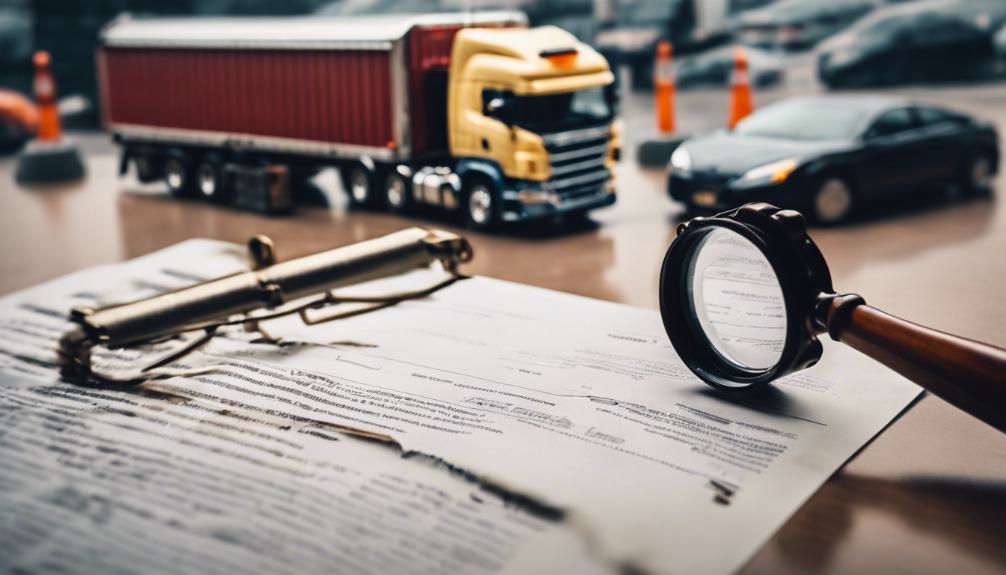
Evaluating the trucking company's liability is an important step in securing the compensation you deserve for your accident damages. Remember, the trucking company may share responsibility for the crash. This could be due to various reasons, such as failure to maintain the vehicle properly or not adhering to federal safety regulations. It's critical to gather all the evidence that points to their negligence. This includes documenting the scene, talking to witnesses, and collecting all relevant information that highlights their fault. Don't forget, other parties might also share liability, so it's vital to consider every angle. Having a legal expert by your side can significantly help in identifying all responsible parties and ensuring you're pursuing the right entities for compensation.
Lawsuit Filing Timeline

After determining the trucking company's liability, it's time to focus on the timeline for filing a lawsuit to make sure you don't miss any critical deadlines. It's important to understand that each state has its own statute of limitations for filing personal injury or property damage claims. This means you've got a specific window of time from the date of the accident to initiate legal action. Missing this deadline could forfeit your right to seek compensation altogether. Start by researching your state's specific timelines, and consider consulting with a legal expert to navigate this process effectively. Remember, the clock starts ticking the moment the accident occurs, so it's crucial to act promptly and secure the best chance for a successful outcome.
Utilizing Regulations and Statistics
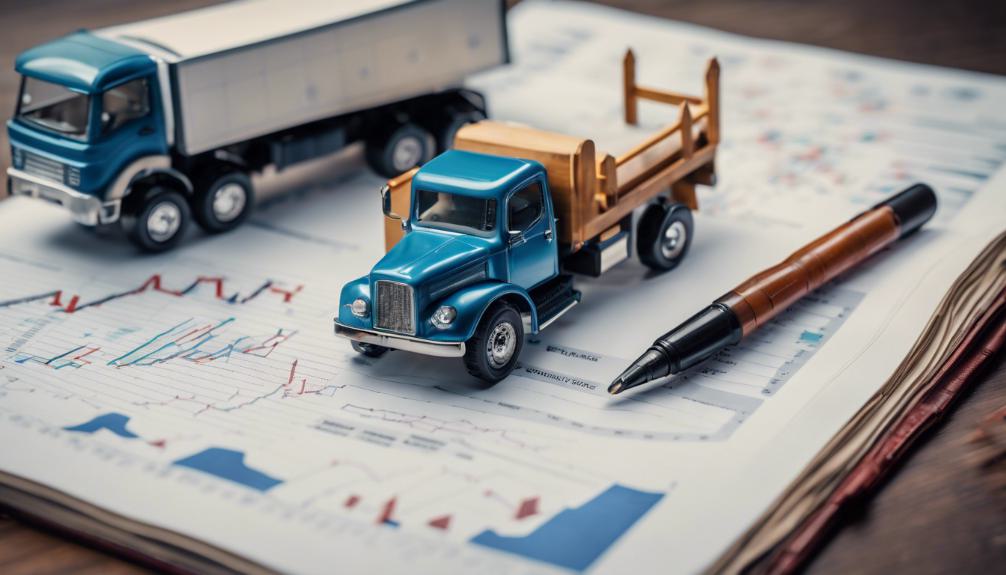
To strengthen your case against a trucking company, it's crucial to leverage FMCSA regulations and relevant statistics. Familiarize yourself with Federal Motor Carrier Safety Administration (FMCSA) guidelines that govern trucking operations. These regulations cover everything from driver work hours to vehicle maintenance standards. Highlighting any violations can greatly bolster your claim. Additionally, incorporating statistics from reputable sources like the Insurance Information Institute can provide a broader context to your case, illustrating the frequency and severity of trucking accidents. This data not only supports your specific allegations but also emphasizes the systemic issues within the trucking industry. By utilizing these regulations and statistics, you're not just building a stronger case; you're also underlining the need for accountability and safety improvements within the trucking sector.
Frequently Asked Questions
What Should I Do if the Trucking Company Offers Me a Settlement Before I Have a Chance to File a Claim?**
If you're offered a settlement before filing a claim, don't rush. Consult a lawyer to guarantee it's fair. They'll help you understand if it fully covers your damages or if you should negotiate more.
This Question Delves Into the Strategic Considerations a Victim Needs to Make When Approached With an Early Settlement Offer, Which Is Not Typically Covered in the Basic Steps of Pursuing Legal Action or Understanding the Broader Legal Process.
'A bird in hand is worth two in the bush,' but don't rush to accept a settlement. Consider your long-term needs and consult a lawyer to verify you're not short-changing yourself with a quick settlement.
How Does the Involvement of Multiple Vehicles Affect My Claim Against a Trucking Company?**
When multiple vehicles are involved in your accident, it complicates your claim. You'll need to identify all parties at fault, which might affect the compensation you're entitled to. Gathering thorough evidence is crucial.
This Question Addresses the Complexity of Accidents Involving Multiple Vehicles and How This Scenario Impacts the Process of Claiming Against a Trucking Company, a Topic Not Usually Detailed in Sections Focused on Direct Actions Against a Single Entity or Understanding Legal Principles.
You're tackling the intricacies of multi-vehicle accidents, highlighting how they complicate claims against trucking companies. It's important to understand each party's role and liability to navigate this complex legal landscape effectively.
Can Social Media Posts About My Accident Impact My Lawsuit Against a Trucking Company?**
Sure, venting on social media feels good, but it can backfire if you're suing a trucking company. Those posts might undermine your case, showing you're not as injured as claimed. It's a legal minefield!
Conclusion
In wrapping up, it's important to remember you're not alone in this journey. A staggering 74% of all fatal passenger vehicle cases involve a large truck. This statistic isn't just a number—it's a call to action, urging you to hold negligent parties accountable. By understanding the legal process, documenting everything, and leveraging regulations, you're taking powerful steps toward justice. Don't let the complexity deter you; with the right support, you can navigate this path and secure the compensation you deserve.

This post has been generated by AI and was not reviewed by editors. This is Not legal advice. Please consult with an attorney.
![Average Settlements For 18-Wheeler Accidents [2024] 47 18 wheeler accident settlements 2023](https://lawsuitlegit.com/wp-content/uploads/2024/03/18_wheeler_accident_settlements_2023-150x150.jpg)



